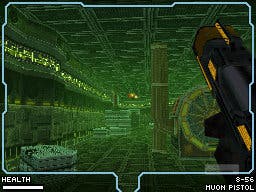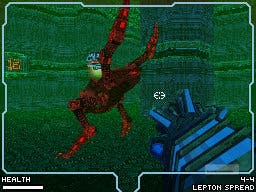Moon
No atmosphere.
Bury yourself a little further into Moon's Labyrinthine catacombs, however, and it'll all start to look a bit familiar. Textures may well be detailed and atmospheric, but there really aren't that many of them. The robotic enemies that form the bulk of the opposition have fewer than a dozen variations, and that's if you include slightly different paint-jobs. As you progress, the stakes are upped by increasing the number and toughness of existing foes, rather than by introducing new enemy types. The flat sprites of the alien machines all too quickly become commonplace, sapping excitement and tension from any firefight with their familiarity. Your robotic adversaries also suffer from a distinct lack of personality. Understandable enough for machines, of course, but the clinical nature of Moon's design ethic does nothing to assuage their factory-pressed convention.
Firefights are generally quite enjoyable - Moon's use of the d-pad to run and strafe - with the stylus acting as an aimer and the shoulder button to fire - means that control is generally responsive enough to dart in and out of corner cover, and accurate enough to drop satisfyingly precise ordnance on the enemy. In the occasional set-pieces this results in a smoothly enjoyable back and forth, but all too often it's a case of one or two drones floating lazily around a room or at the end of a corridor, waiting for Kane to turn up and fry them. Again, challenge tends to be increased by the addition of more enemies rather than by any particularly strategic engagements.

The flaws in the pacing also extend to the regularity of save-points and the supply of health and munitions. The most difficult confrontations, especially those with the game's repetitive and frustrating bosses, tend to be held annoyingly far from the safety of recorded progress, and the fact that all health and ammo drops come randomly from enemies also means that it's quite common to end up bringing a knife to a gunfight – or at least a weedy gun to an extraordinarily large gun fight.
It's not all shooty-bang-bang on the moon, though - a puzzle-solving element is introduced early on by the discovery of a miniature drone buggy, essentially a extraterrestrial RC car, fitted with a ion-blaster for stunning drones and opening cat-flaps. Sorry, access hatches. Selecting the drone from the weapon menu puts players in direct control of the wee-wheeled beastie, scooting about quickly but vulnerably.
What this generally entails is coming across a shield barrier, conveniently located next to one of the floor-level hatches. Pop the buggy in here for a nose around and sooner or later you should spot a shield-deactivating node ripe for the blasting. Do so, switch back to Kane and stroll through the resulting gap before driving the car back for putting back into the toy box. It's a nice variation. The first two times you have to do it. The next 14 or so, despite mild variations and complications, are less enthralling.

Lasting impressions of Moon are of a game rushed to completion, a re-skin tacked on to a proven engine to wring maximum revenue from it. There's little charm, grace or individuality to be found, and the polished nature of the coding framework seems especially stark as a result.
It's a real shame that so much meat is lacking from the bones here, because there's massive potential in Renegade Kid's engine for an atmospheric and engaging FPS, but lacklustre finishing means a quite forgettable end product. Sadly, this also seems like a step backwards from Dementium, a recession into a less inventive mechanic. There are undoubtedly high points, such as the (mostly) excellent soundtrack, the fantastic controls and the truly impressive engine, but Moon is really just a supermodel in the Emperor's clothes, intriguing at first - but leaving very little to the imagination.
